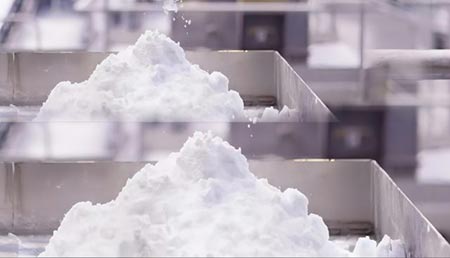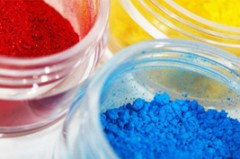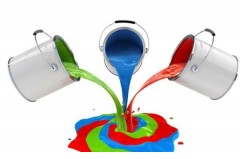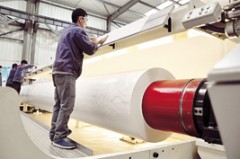Application
Natural Barium Sulphate VS Precipitated Barium Sulphate
Natural barium sulphate/barite powder and precipitated barium sulphate are common mineral fillers on the market. Natural barium sulphate is directly made by physically-processed barite powder and precipitated barium sulphate is made by chemical precipitation. What is the difference between the two?
Production Processes
Natural barium sulphate is raw barite mineral processed through crushing, washing, and grinding, which is a purely physical process. The raw barite is crushed at the mine and then cleaned with washing equipment to remove the sediment on the surface. Finally, it is ground into ultrafine powder with a specified size by the grinding machine according to customers’ demand.

Precipitated barium sulphate is chemically produced. The reaction is to mix barium sulfide solution with sodium sulphate solution after removing calcium and magnesium and carry out the chemical reaction at 80℃ to produce the precipitate. Then the barium sulphate precipitate is processed through filtering, water washing, and acid washing, and its pH value is controlled between 5-6. Finally, after another round of filtering, drying, and crushing, the precipitate is made into industrial precipitated barium sulphate powder. Precipitated barium sulphate can also be obtained by mixing barium yellow brine with sodium sulphate solution.
Content of Barium Sulphate
Limited by the source quality of the barite mine, the barium sulphate content of natural barium sulphate is very unstable, generally less than 85% due to the impurities contained in the minerals. But it is not the case with precipitated barium sulphate. After the extraction and precipitation process, the reaction has removed various impurities and the barium sulphate content can reach 99%. This makes precipitated barium sulphate an ideal filler suitable for refined chemicals, such as performance waterborne coatings, automotive coatings, electronic ink, etc.
Differences in the Particle Size
In the filling powder industry, the unit called “AIM” is used to measure the particle fineness of a product. The higher the AIM value, the smaller the particle size. Nowadays, there is 300 mesh to 12500 mesh barium sulphate in the market, of which 300 mesh is mainly natural barium sulphate, while the precipitated barium sulphate is generally above 10000 mesh.
Downstream Applications
Natural barium sulphate is usually used in downstream products that don’t require very high purity and whiteness, ultrafine particle size, excellent dispersion, or high oil absorption, such as general paints and plastics. Precipitated barium sulphate can be used for mid to high-end applications such as performance water-based coatings, automotive coatings, electronic inks, engineering plastics, and many more.

Market Prices
It can be seen from the production processes that the production cost of the two differs greatly and the output is also different. Natural barium sulphate has a simple production process and large output, so the price is relatively low. Precipitated barium sulphate is produced through a series of complex processes including calcination, synthesis, extraction, precipitation, and drying, which requires the consumption of a large amount of electricity, coal, sodium sulfide, and barite. So its daily output is limited and the cost is much higher than that of natural barium sulphate.
In addition to the above differences, there is also a big difference between natural barium sulphate and precipitated barium sulphate in terms of product parameters, click here to learn more. If you encounter any problems in using barium sulphate products, please feel free to contact us. XINTU Chemical has a group of technical experts who have been serving many industries and solving problems from practical perspectives for global customers. According to different customers’ needs, we can customize different specifications of barium sulphate products.




